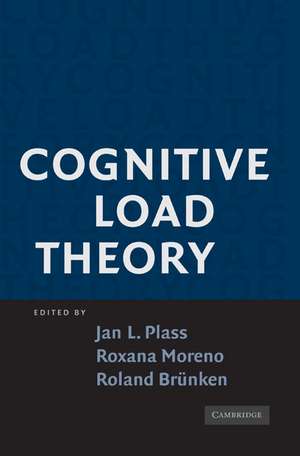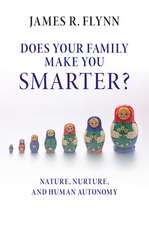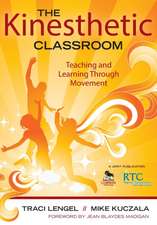Cognitive Load Theory
Editat de Jan L. Plass, Roxana Moreno, Roland Brünkenen Limba Engleză Paperback – 25 apr 2010
| Toate formatele și edițiile | Preț | Express |
|---|---|---|
| Paperback (1) | 284.98 lei 6-8 săpt. | |
| Cambridge University Press – 25 apr 2010 | 284.98 lei 6-8 săpt. | |
| Hardback (1) | 696.96 lei 6-8 săpt. | |
| Cambridge University Press – 25 apr 2010 | 696.96 lei 6-8 săpt. |
Preț: 284.98 lei
Nou
Puncte Express: 427
Preț estimativ în valută:
54.53€ • 57.09$ • 45.12£
54.53€ • 57.09$ • 45.12£
Carte tipărită la comandă
Livrare economică 05-19 aprilie
Preluare comenzi: 021 569.72.76
Specificații
ISBN-13: 9780521677585
ISBN-10: 0521677580
Pagini: 286
Ilustrații: 13 b/w illus. 20 tables
Dimensiuni: 152 x 229 x 15 mm
Greutate: 0.39 kg
Editura: Cambridge University Press
Colecția Cambridge University Press
Locul publicării:New York, United States
ISBN-10: 0521677580
Pagini: 286
Ilustrații: 13 b/w illus. 20 tables
Dimensiuni: 152 x 229 x 15 mm
Greutate: 0.39 kg
Editura: Cambridge University Press
Colecția Cambridge University Press
Locul publicării:New York, United States
Cuprins
Introduction Jan L. Plass, Roxana Moreno and Roland Brünken; Part I. Theory: 1. Cognitive load theory: historical development and relation to other theories Roxana Moreno and Babette Park; 2. Cognitive load theory: recent theoretical advances John Sweller; 3. Schema acquisition and sources of cognitive load Slava Kalyuga; 4. Individual differences and cognitive load theory Jan L. Plass and Slava Kalyuga; Part II. Empirical Evidence: 5. Learning from worked-out examples and problem solving Alexander Renkl and Robert K. Atkinson; 6. Instructional control of cognitive load in the design of complex learning environments Liesbeth Kester, Fred Paas and Jeroen J. G. van Merriënboer; 7. Techniques that reduce extraneous cognitive load and manage intrinsic cognitive load during multimedia learning Richard E. Mayer and Roxana Moreno; 8. Techniques that increase generative processing in multimedia learning: open questions for cognitive-load research Roxana Moreno and Richard E. Mayer; Part III. Discussion: 9. Measuring cognitive load Roland Brünken, Tina Seufert and Fred Paas; 10. From neo-behaviorism to neuroscience: perspectives on the origins and future contributions of cognitive load research Richard E. Clark and Vincent P. Clark; 11. Cognitive load in learning with multiple representations Holger Horz and Wolfgang Schnotz; 12. Current issues and open questions in cognitive load research Roland Brünken, Jan L. Plass and Roxana Moreno.
Recenzii
“This handbook provides an extensive account of the history, current state, and future prospects of the influential Cognitive Load Theory framework for the design of multimedia educational experiences. I plan to use this excellent book in my own classes and research. I didn't get overloaded reading this in-depth coverage, so the authors seem to practice what they preach.”
– John B. Black, Teachers College, Columbia University
"Within the last two decades, CLT has become one of the most cited instructional design theories along with Richard E. Mayer’s Cognitive Theory of Multimedia Learning. The book provides a valuable and accessible resource for familiarizing students at the undergraduate and graduate level with CLT’s basic theoretical assumptions as well as with the extensive empirical research that has been conducted against the theory’s background. The chapters have been written by notable CLT researchers and nicely cover the state of the art achieved in cognitive load research. Whereas a book like this cannot possibly solve the theoretical and measurement challenges that have been uttered by researchers from different fields in the last years, it does a good job in openly discussing these issues.”
– Friedrich W. Hesse, Knowledge Media Research Center, Tuebingen
“Cognitive Load Theory bridges cognition and instruction and is one of the few prescriptive instructional theories. The editors and authors of this volume are the key individuals for both the theoretical and the empirical development of Cognitive Load Theory. A must-have book if one is interested in instructional design and the improvement of student learning.”
– Harry O’Neil, University of Southern California
“Cognitive Load Theory and the empirical research it has spawned over two decades provide a powerful tool for understanding why learners surmount or succumb to challenges in learning, solving problems and transferring skills. This volume synthesizes and articulates this work with clarity and an encyclopedic scope, drawing a clear and helpful map of the field’s terrain for instructional designers and theorists alike.”
– – Philip H. Winne, Simon Fraser University
– John B. Black, Teachers College, Columbia University
"Within the last two decades, CLT has become one of the most cited instructional design theories along with Richard E. Mayer’s Cognitive Theory of Multimedia Learning. The book provides a valuable and accessible resource for familiarizing students at the undergraduate and graduate level with CLT’s basic theoretical assumptions as well as with the extensive empirical research that has been conducted against the theory’s background. The chapters have been written by notable CLT researchers and nicely cover the state of the art achieved in cognitive load research. Whereas a book like this cannot possibly solve the theoretical and measurement challenges that have been uttered by researchers from different fields in the last years, it does a good job in openly discussing these issues.”
– Friedrich W. Hesse, Knowledge Media Research Center, Tuebingen
“Cognitive Load Theory bridges cognition and instruction and is one of the few prescriptive instructional theories. The editors and authors of this volume are the key individuals for both the theoretical and the empirical development of Cognitive Load Theory. A must-have book if one is interested in instructional design and the improvement of student learning.”
– Harry O’Neil, University of Southern California
“Cognitive Load Theory and the empirical research it has spawned over two decades provide a powerful tool for understanding why learners surmount or succumb to challenges in learning, solving problems and transferring skills. This volume synthesizes and articulates this work with clarity and an encyclopedic scope, drawing a clear and helpful map of the field’s terrain for instructional designers and theorists alike.”
– – Philip H. Winne, Simon Fraser University
Descriere
A comprehensive review of all issues related to cognitive load theory, written by prolific researchers from around the world.













